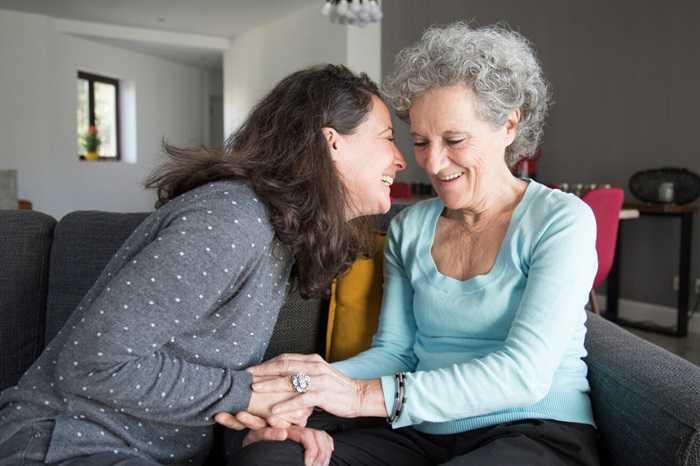

Whether you’re planning to care for your elderly Mum, Dad, or relative this guide is for you.
We’ve included actionable steps and helpful resources so you can make an informed choice about how to best care for someone you love.
Recognising when care is needed might be a gradual process as small changes in their behaviour, appearance or physical abilities can go unnoticed when we see someone often.
There are signs that an older adult may need care that you can look out for.
Noticing a decline in someone else’s health can be upsetting, particularly when that person is your Mum or Dad and has cared for you.
As they age and possibly develop illnesses, pain or disabilities, it can make us think about the future and whether the right resources and processes are in place to provide the level of care they deserve.

Recognising when care is needed might be a gradual process as small changes in their behaviour, appearance or physical abilities can go unnoticed when we see someone often.
There are signs that an older adult may need care that you can look out for.
Noticing a decline in someone else’s health can be upsetting, particularly when that person is your Mum or Dad and has cared for you.
As they age and possibly develop illnesses, pain or disabilities, it can make us think about the future and whether the right resources and processes are in place to provide the level of care they deserve.
As the caregiving roles reverse, facing up to the reality that you may now be responsible for an elderly parent’s care as an unpaid carer can feel daunting.
Making a plan to care for someone else can help you provide a better standard of care. To provide the assistance that an older adult may need, you first need to think about how complex their needs are and whether the environment that they’re currently in, whether that be their own home or yours, is suitable for them.
Lots of ageing adults require mobility aids such as hoists, adjustable beds or a shower transfer bench and these can be expensive.
The changes required to accommodate an elderly person’s needs can be complex which is why it’s important to assess exactly what is needed, how much it would cost and whether the changes can be made in a reasonable timeframe to support your Mum or Dad.
Depending on the needs of the elderly person that you’re planning to care for, you may need to make adjustments to your home including:
Even if your Mum or Dad has dementia, mental health problems, a disability or lack of capacity they should still be included at every step of the way; from the first conversation about their care to ongoing care plan reviews.
As a child of a person who needs care, you have a lot to consider and there are important decisions to make. You must consider your circumstances as well as the circumstances of your parent, and look realistically at what you can do to contribute to their care.
Your local social services department usually conducts a care needs assessment, however, a GP may also conduct one.
During the assessment, which is usually a face-to-face appointment, the assessor will ask the elderly person questions about their health and abilities to determine the level of care that’s needed.
A care needs assessment may involve questions including:
The person conducting the assessment can advise on whether further help or adjustments to the home may be needed now or in the future.
They may also suggest additional sources of help or services that can support you and the person you’re planning to care for including:
Caring for someone else is rewarding but can be stressful and at times lonely. The best way to provide the care that your loved one needs and deserves is to take time for yourself now and then to recharge.
Respite care can provide you and your Mum or Dad with a temporary break, whether that be for an afternoon, a few days or a couple of weeks.

You may find it helpful to find out about training courses that could help you care for your elderly relative. This might include a course in first aid, dementia care or an NVQ in care.
The definition of an unpaid carer is a person who cares for someone who is ill, disabled, older, has mental health concerns and is not paid by a company or local authority to do this.
Yes, an unpaid carer may be able to receive financial support from a Carer’s Allowance.
Carer’s Allowance is money paid to a person who cares for another person for at least 35 hours a week. You may have a job alongside your responsibility as a carer and if that’s the case, you may also be entitled to support and flexible working from your employer.
£76.75 a week is paid directly into the claimant's bank account, usually every 4 weeks.
For each week you get Carer’s Allowance you’ll also automatically get National Insurance credits.
You don’t have to live with the person you care for and don’t need to be related to be eligible for Carer’s Allowance.
However, to receive Carer’s Allowance, the person you’re caring for must receive one of the below benefits:
If you need further support with finding out how to pay for care or receive support while caring for an elderly relative, call our elder care experts on 01892 335 330.
Depending on your unique circumstances, you may find it more manageable to share your care responsibilities.
Asking for help from a professional care worker is a responsible thing to do, especially if you’re feeling overwhelmed or out of your depth with the complexity or level of care that is needed.
Furthermore, many children of older adults needing care are still in employment or may be raising children and despite all efforts, they don’t have the amount of time to dedicate themselves to round-the-clock care.
When people think of care, they usually imagine a nursing care home but in the UK, there are a multitude of care options that deliver different levels of assistance.
There are also specialisms within each category too, for example, through the Autumna search directory, you may be able to find a home care worker that specialises in diabetes or a live-in carer that specialises in bariatric care.
The most important thing is the well-being of the elderly adult and how they feel about who delivers their care and where it is received. Always communicate with them, asking how they feel and what they want.
Even if they can no longer talk, as their son or daughter you may be able to recognise gestures, and facial expressions or read their handwriting, for example, to get a better understanding of their wishes.
We welcome calls to our free advice line, for anyone seeking clarity or guidance on all things related to care.
Autumna is an impartial hub of information with access to over 26,000 care providers across the UK. Whether it’s a question about finding, planning or paying for care, our elder care experts are available 7 days a week to listen on 01892 335 330.
Yes, it is possible to care for a parent or loved one who is nearing the end of their life however, you must have support and the right medical assistance to provide the quality of care that will be needed.
A terminally ill parent may need round-the-clock care or specialist medical treatments. You may need to assist in giving medication, changing dressings or moving them to minimise bedsores.
Caring for a dying parent or loved one is emotionally challenging so it can be useful to have someone to talk to, whether that’s a friend, other family member or a support network.
10,413
Care Homes
12,403
Home Care Services
1,671
Live-in Care Services
1,826
Retirement Living Developments
Autumna is the UK's largest and most comprehensive later-life living & elderly care directory. Our detailed search facility and team of expert advisors can help you find the best care homes, nursing homes, retirement homes, retirement villages, home care, and live-in care services for you or your loved one's needs. Our website is free to use, we are proudly independent, and we never take referral fees.